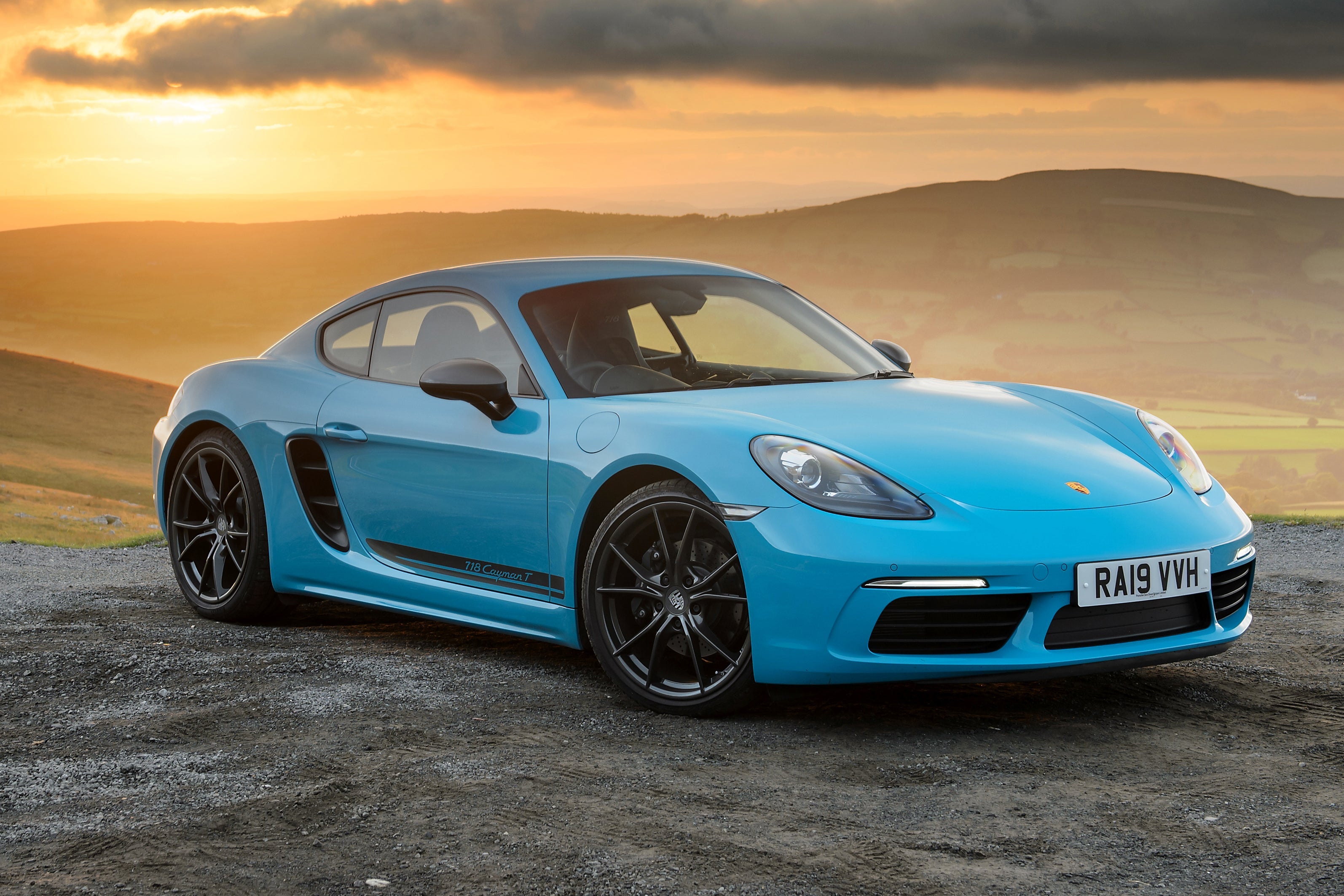Alpine A110 Review 2023
Written by Andrew Brady
Quick overview
Pros
- Brilliantly engaging, light and fun to drive
- Surprisingly economical at a cruise
- More interesting and different than the sports car norm
Cons
- Infotainment is rubbish and cabin is a touch low-rent
- Lacks luggage space compared to key rivals
- A thoroughbred sports car should have a manual gearbox option
Overall verdict on the Alpine A110
"Our Alpine A110 review joins the chorus of praise for a sports car that harks back, not just visually, to a bygone age where driving was engaging and fun, without an emphasis on big power and ridiculous speeds. It's far from perfect, however. "
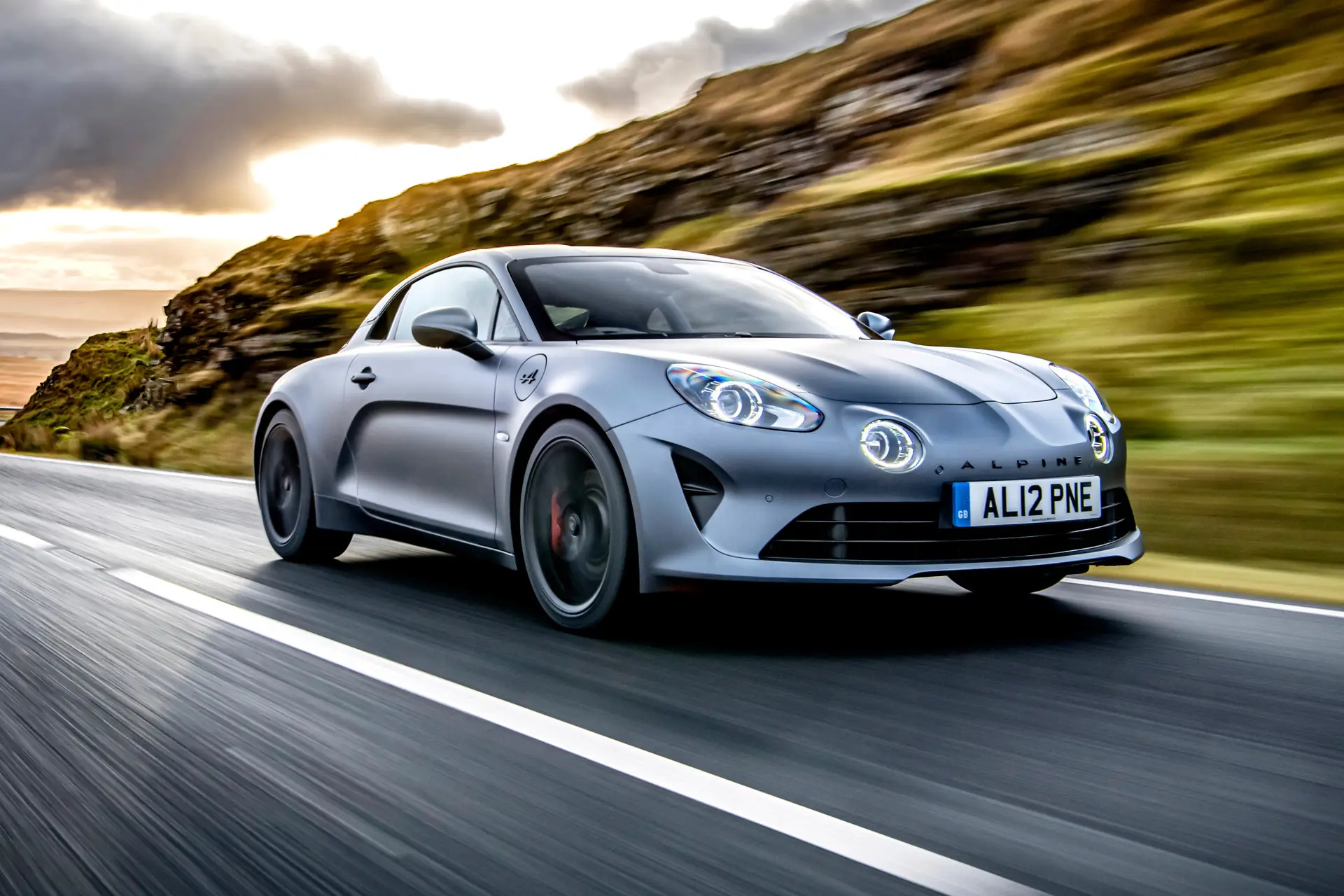
The Alpine A110, pronounced ‘Alpeen’ should you not know (which, frankly, you could be forgiven for) is a French sports car that was introduced to shake up the dwindling 'true' sports car market. Renault decided to revive a badge from its past, building a modern interpretation of the company’s most successful sports car - also called the Alpine A110.
Renault has long owned the company, and in either a masterstroke of brand revival, or mad moment of ill-considered motorsport nostalgia, decided to re-introduce it after a two decade hiatus and take the fight to established sports car brands. It also has to offer enough to draw buyers away from the new-age practical performance cars such as hot hatches and powerful SUVs.
It’s not just the name that evokes Alpine’s illustrious motorsport past, but the shape of the A110, it echoes closely that of the original from the late 1960s. Compact, light and balanced, Alpine’s nod to the past is not only very deliberate, but it also bucks the trend for weightier, big power sports cars and supercars, to tremendous effect.
The A110 is a car very much aimed at a purist driving enthusiast audience and Alpine has put tremendous effort into making it as light as possible. As such, the entry level Alpine A110 Pure weighs in at around 1100kg. That is hundreds of kilos less than the majority of its rivals, including the Porsche Cayman, Toyota Supra and BMW Z4.
That low weight allows modest power, but no less scintillating performance. Indeed, no A110 is more powerful than 300PS, and the majority are 252PS, with the biggest output of 292PS reserved for the range-topping A110S and Legende GT models.
In all there is performance to rival, and better, some very good rivals. Any A110 will reach 62mph from a standstill quicker than a standard specification Porsche Cayman S, for example, which is admirable given the power deficit, but while it impresses against the stopwatch, it’s in the corners where the Alpine really shines.
We’re not sure whether it’s something in the water in France, or just childhoods being driven around in fine-riding Citroens, but French chassis engineers have an incredible knack of giving incredible driving engagement and chassis balance, allied to a supple comfort and ride that takes the edge off even our tortuously surfaced roads.
To achieve that, while still offering the sort of feel and detail that demanding drivers demand really is a dark art, but it’s one that the people at Alpine have evidently mastered.
A hugely entertaining driver’s car, then, but there is a pay-off to that. It’s not just the fact that most of your friends won’t have heard of the French sports car firm, or, perhaps rightly, wonder why you didn’t just buy a Porsche like everyone else does.
Whether they’d be right is down to what you want from your £50,000+ sports car. For that sort of money there's an awful lot of talented competition. If you want useable performance, huge entertainment at road speeds and the sort of bespoke, special feel that’s lacking in most of its competition, then step this way.
If you want an interior and infotainment befitting of that not insignificant outlay, or indeed the sort of practicality that might make it a daily driving proposition rather than an occasional plaything, then you might want to look elsewhere. However, if you’ve gotten this far (well done) you’re obviously interested, so, read on…
Is the Alpine A110 right for you?
If Monte Carlo is about rallying to you and not casinos, then why aren’t you already out driving your Alpine A110? If you're a car enthusiast and a keen driver, but you don’t want a Porsche Cayman – because that’s what everyone buys. You’d consider an Audi TT as too blunt a driving tool and a Lotus Elise too hardcore and basic.
The A110 is fairly singular in its intent; it’s a car to enjoy driving in. You’ll not have the space or any of the practicality of something like a Ford Fiesta that it weighs less than, but you’ll happily put up with some compromises for the utter joy it brings. All that sound familiar? Then there’s an Alpine salesman who wants to meet you, desperately.
What other cars are similar to the Alpine A110?
The Alpine A110 operates in a relatively narrow bandwidth, its focus on driver appeal. At one extreme end of the spectrum you could suggest very pure cars like Caterhams, Ariel Atoms and suchlike, even if the Alpine isn’t quite so extreme in its compromises.
It'll cruise pretty quietly and comfortably, for one, and although it isn't practical it could easily be a daily driver. In reality it probably sits between something like a Lotus Elise and a Porsche Cayman, erring closer to the Porsche in concept, but more like the Lotus in execution.
Indeed, the A110 is a pretty difficult car to categorise, largely because it’s not directly comparable to anything else, even if its price and performance do make it sit alongside things like that Porsche, however comfortably or not.
Comfort and design: Alpine A110 interior
"A low, focused sports car, the Alpine A110 isn’t really designed with practicality in mind. You’ll have to clamber into the sports seats, but once you’re in there they’re hugely supportive and provide good long-distance comfort."
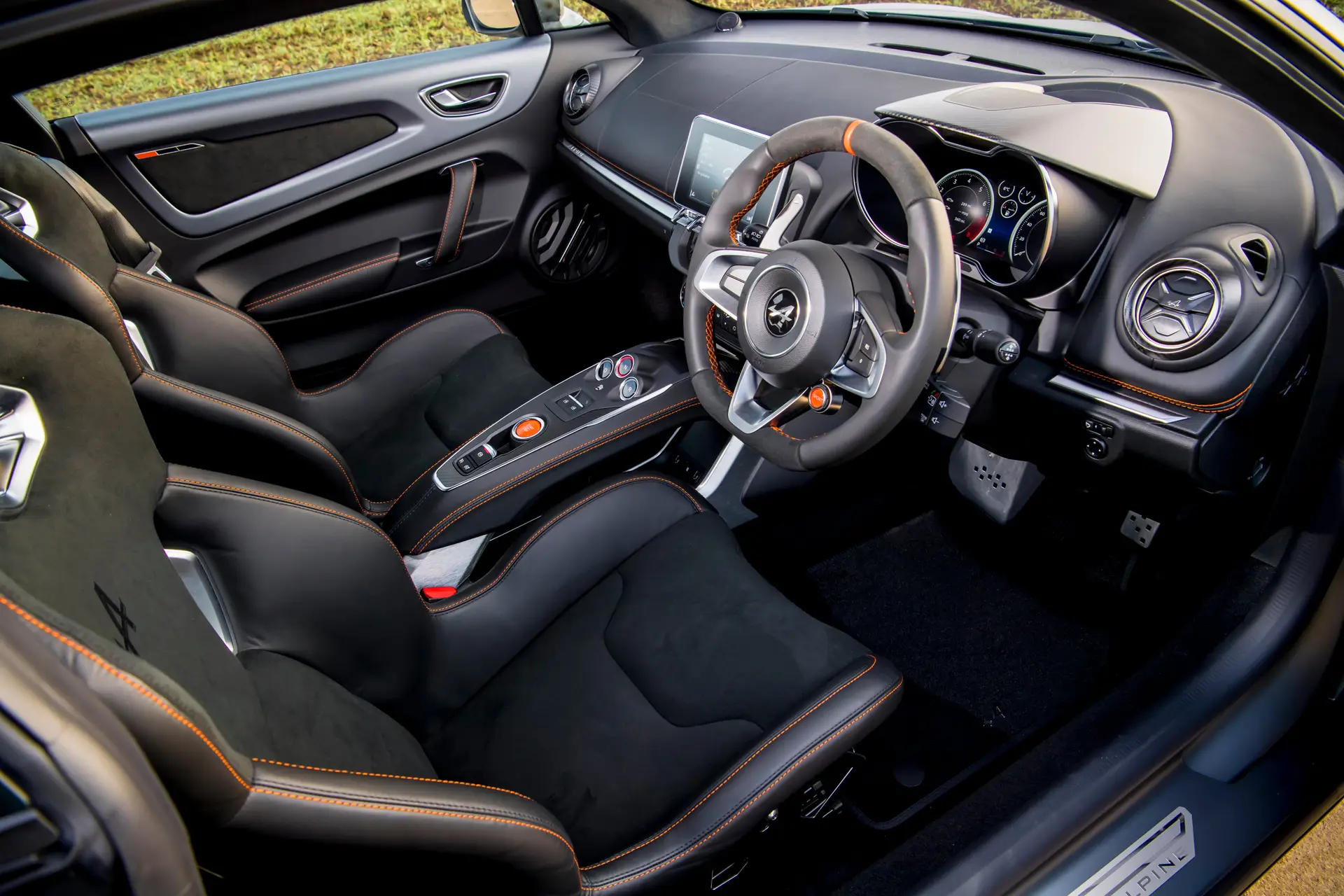
The Alpine A110's suspension’s clever trick of being supple yet controlled also pays dividends over some choppier, busier riding rivals, making it a useable long-distance proposition should it need to be.
Where it falls short is in areas around the interior. The infotainment - largely ripped out of the last-gen Renault Clio - is fiddly and slow while the digital dash looks a bit cheap. A set of proper analogue dials in front of you would be so much more appealing and easy to read, too.
You’ll need to get used to things rattling around inside, as, in a quest for absolute minimum weight, Alpine has omitted useful things like a glovebox. Or even door bins to chuck a phone or some sweets in.
At least the heater and ventilation controls are conventional, Alpine resisting the trend of many to put these into the multimedia touchscreen. A pair of big, simple rotary dials allow you to quickly and easily set your preferred temperature and airflow.
The cabin layout is fit for its intended purpose then, even if that purpose does mean some compromises in usefulness, the expectation being that you’ll be enjoying driving too much to care about the fact that there’s nowhere useful to put your phone, wallet, etc when you’re in it.
Quality and finish
The Alpine A110’s chief, and most unforgivable, failing is its interior. Looking in from outside it all superficially looks good, with a flying centre console, nicely designed steering wheel and instrument cowl behind it and deeply bolstered sports seats.
Getting in reveals some of the subterfuge, with many of the materials falling significantly short of expectations of a car with a price tag, which in 2022 starts at just under £50,000 and can be specced up to over £70,000.
We’re used to parts sharing in sports cars, as even Aston Martin borrows bits from Mercedes-Benz. But here, and unsurprisingly, the Alpine borrows a lot of its interior bits from its Renault parent company.
The stalks and switches from a £10,000 Twingo city car really aren’t befitting in something commanding the price the Alpine does. Consider, too, that it’s in a class that sees it line up alongside with a car like the Audi TT, with its beautifully designed and executed interior, or indeed the granite-hewn Porsche Cayman.
Even the people at Toyota realising in its joint venture with the BMW’s Z4 to produce its Supra, that Toyota should use the premium maker’s interior parts. Experience of Renault interiors does suggest that some of those materials might look even less impressive in a few years time, let alone a decade or two.
Infotainment: Touchscreen, USB nav and stereo in the Alpine A110
Like all the interior switches, dials and stalks, the infotainment is a version of something that could be found across Renault’s model range a few years ago.
It’s wasn't a particularly impressive system to feature in a mainstream, volume car line-up back then. Even re-branded to suit the Alpine, when it’s placed in a car that counts rivals from Porsche, Audi and BMW, it falls significantly short of expectations.
The navigation mapping lacks the clarity and detail of the best systems out there, or indeed what you’ll find in your pocket on your smartphone, the operation of the Alpine’s infotainment feeling particularly clunky and slow.
There’s connectivity on offer, but it’s last generation levels of it, the Alpine doing without either Apple CarPlay or Android Auto, which are a specification given among its rivals in this class. What should be simple tasks like adjusting the navigation or changing radio stations needs practice and patience.
Likewise, the digital instrumentation lacks the sharp looks of things like Audi’s Virtual Cockpit, and the inability to have the A110 in Sport mode without its instrument dials changing to a fussy layout is a frustration.
Space and practicality: Alpine A110 boot space
The A110 is light in weight and clear in focus, but that focus does not relate to practicality. Indeed, Alpine makes the A110’s compact dimensions a virtue in its goal to create an entertaining driver’s car.
The Alpine A110's dimensions make it pretty compact, with a length of 4181mm, a width of 1798mm and a height of just 1248mm. That's the same width as a Clio and a noticeably shorter length than a Golf.
Despite the modest external size the cockpit is decently accommodating, with drivers of 6ft and over able to get comfortable behind the wheel. The steering column moving for rake and reach helps here, as does the low position of the seat in the cockpit.
If the driver and passenger are decently accommodated it’s at the expense of space for much else. No small rear seats in here like the Audi TT - the A110 a strict two-seater. There’s actually next to no stowage in the interior either, the cabin’s width not intruded into by anything as useful as a door bin.
Likewise, reach under the dashboard in front of the passenger and you’ll not find a glovebox. Keep your phone, keys etc in your pockets then, as the only solution Alpine offers is an optional cargo net and interior storage case which cost £460 when new. Most buyers didn’t bother.
For more substantial luggage you’ve a choice of boots, the A110’s mid-engined layout meaning there’s one up front and another in the back. Don’t think that means you can be wanton with your packing, as stuff for more than a weekend away, packed in soft bags will fill the combined 196 litres of boot capacity offered by the front (96 litre) and rear (come on, you can do the maths here) boots.
Forget trips to the cash and carry to stockpile bog roll, flour and yeast the next time there’s the suggestion of a pandemic as you’ll be doing well to get a week’s worth of shopping in. And give up golf, as you’ll not get your clubs in the boot.
It’s a sports car, so to criticise it too much for being impractical is perhaps unfair, but an Audi TT will feel like an estate car in comparison (712 litres if you fold its rear ‘seats’), while that oft mentioned Porsche Cayman’s similarly combined front and rear boots is over double that of the A110 at 435 litres.
Handling and ride quality: What is the Alpine A110 like to drive?
"Just brilliant - and deserving of the praise heaped upon it when it was launched - the Alpine A110’s ability to both deliver driver engagement and fun allied to a supple, cosseting ride is pretty much unsurpassed."
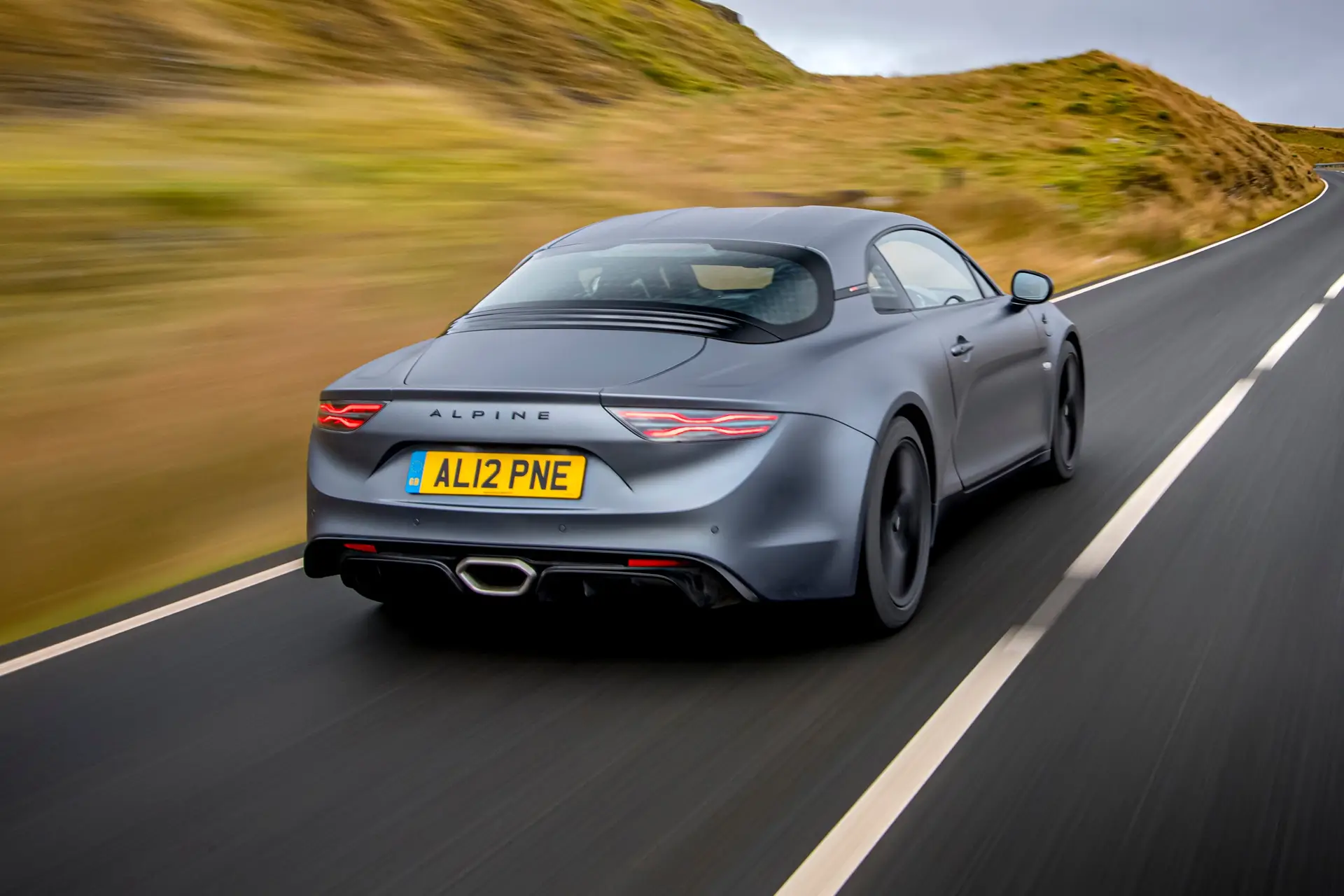
French chassis engineers often (but not always) seem to nail it in the ride and handling department, and the Alpine A110 is arguably the current zenith, certainly among its sports car rivals, indeed, if not of most cars on sale today.
Alpine really has proved you don’t need variable, driver selectable damper modes, instead just setting up a passive double wishbone suspension system perfectly, with superbly judged spring and damper rates.
It rides very smoothly for a sports car, even on the terrible Tarmac that makes up a good portion of roads in the UK, yet it does that without feeling detached or resulting in any loss of body control.
You really do have the sensation of the car moving with you, beneath you. It’s this that makes it so appealing. That manifests itself with fine steering, in weighting, speed and precision, the A110 seemingly pivoting centrally, the steering response detailed and quick.
Push it hard, as you might on a track and not only is that fine chassis and weight distribution even more evident, but so too are the lofty limits of grip on offer. There are no surprises should you breach those grip levels, either. This a talented chassis that can be exploited, and enjoyed – and not just by expert drivers at silly speeds.
The A110S should build on this with its more focussed set-up, but while it would certainly be a bit quicker around a circuit, the tauter suspension, allied with the larger tyre footprint robs it of some of the standard car’s delicacy on the road.
That the A110 amuses at normal, safe road speeds on all roads, from motorways to country roads, with all the stability and traction control systems still on, is testament to this.
Indeed, the A110 a sensation-rich riposte to the sport car market’s obsession with massive grip, ever rising power outputs and detail dead steering allied to multiple-choice, brittle to rock hard suspension. And that makes it pretty special indeed.
What engines and gearboxes are available in the Alpine A110?
One engine powers the Alpine A110, a four-cylinder turbocharged 1.8-litre unit that also sees service in a number of RenaultSport’s hot Clio and Megane models.
In the Pure and Legende power output is 252PS with torque of 320Nm, while the A110S, introduced in late 2019, gets a modified version of the same 1.8-litre turbocharged engine with its output increased to 292PS.
Torque stays the same with the A110S, at 320Nm, produced from 2000rpm to 6000rpm, which gives the engine great low-rev flexibility. There’s reward if you rev it out though, with peak power in each developed in at 6000rpm, giving the incentive to run it up to its redline.
Do that and the paddle-shifted seven-speed twin clutch automatic transmission reacts quickly, changing the driving modes through from Normal through Sport and onto Track.
This changes the mapping of the engine and transmission, as well as slightly raising thresholds for the stability and traction controls to allow you to revel in its performance more. And hear more evocative notes from the sports exhaust if you’ve optioned it. It's got to be one of the most engaging soundtracks of any modern four-cylinder - trust us, you won't miss the five or six-cylinder units of rivals.
However impressive the paddle-shifted automatic proves, it’s a real shame that Alpine doesn’t offer such an analogue, engaging and purist driver's car with a manual transmission and a third pedal, particularly as it would have been true to the original car it apes.
Refinement and noise levels
The Alpine A110 might not be practical as such, but that’s not to say it couldn’t be used on longer journeys. The suspension’s supple ride and the comfortable, supportive sports seats make it a surprisingly able long-distance cruiser, while the fine economy on sustained cruising speed is useful.
Refinement when doing so is admirable, there’s not much in the way of wind noise, being low and slippery in its shape, while there’s not a great deal of tyre on the road so, consequently, there’s not a great deal of road noise. What engine sounds there are aren’t entirely unwelcome, indeed, most of the time they’re enjoyable.
We’re not suggesting you pick an A110 for a lengthy daily commute, but should you have one and need to do the occasional longer journey, or drive it not just for the sheer joy of doing so, then it’s not out of its depth. In fact it’s actually quite adept, so long as you can accept its other compromises of no luggage space and the frustrating infotainment.
Safety equipment: How safe is the Alpine A110?
There’s no Euro NCAP, or other, independent crash tests for the tiny volume Alpine, but Renault’s track record for passenger safety is admirable, so it’s safe to assume that the A110 will have been built along similar principles.
There’s emergency brake assist, driver and passenger airbags, traction and stability control systems, while its agility and those strong brakes should help it avoid an accident in the first place. There’s no spare wheel, a victim of Alpine’s obsessive weight saving, instead you get an inflation kit and some gloop to fix punctures.
The entry Pure model does without parking sensors front or rear, as these are a cost option. The next model, the A110 Legende gains front and rear parking sensors, as well as a reversing camera. Oddly, the highest price model, the A110S loses the reversing camera from its specification.
All can be fitted with the higher performance braking system from the A110S, though it’s an expensive option at over £2,000. There’s no option for Isofix on the passenger seat, either.
MPG and fuel costs: What does an Alpine A110 cost to run?
"For a car that’s so driver focussed the Alpine A110's economy is impressive, but perhaps not surprising given its light weight."
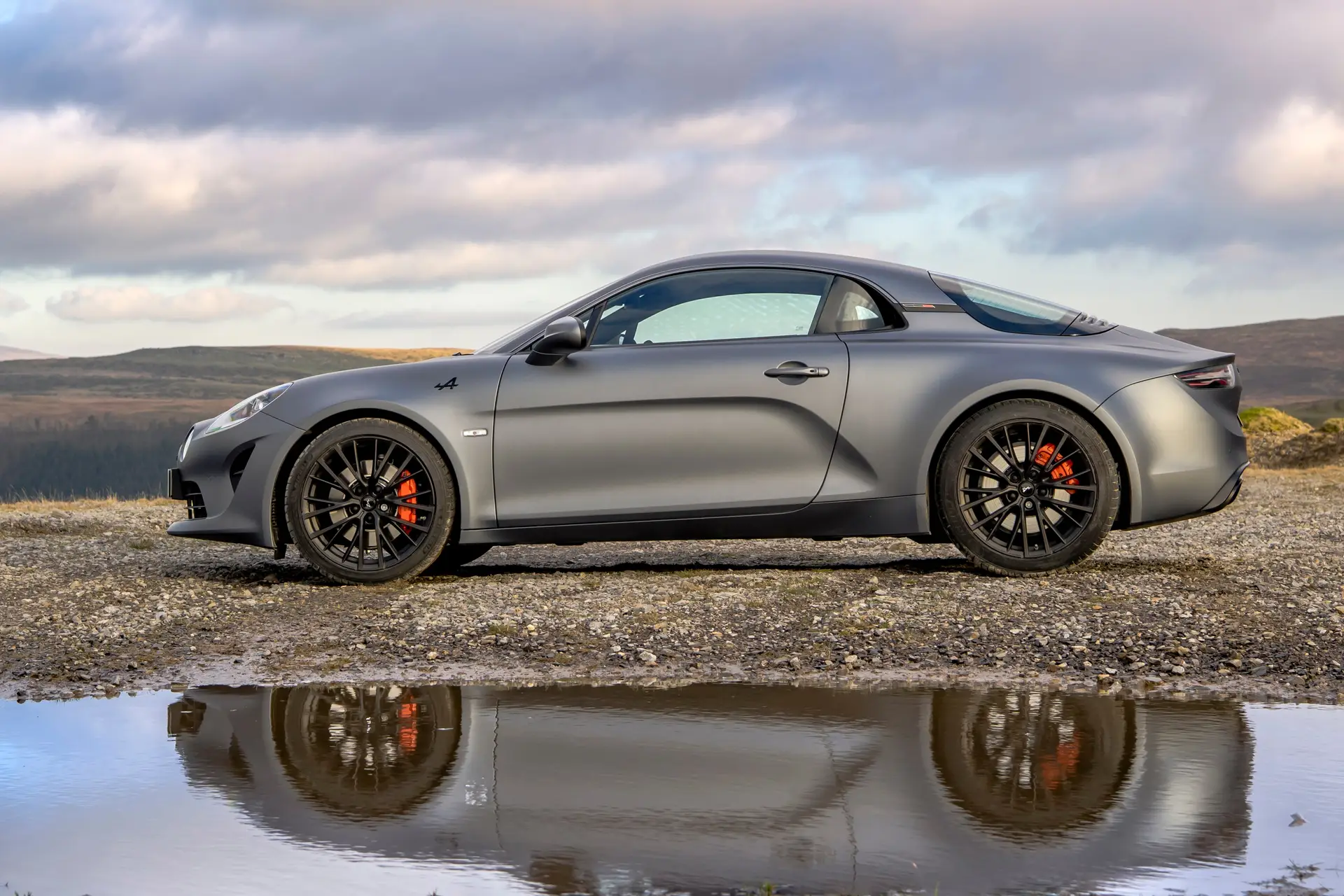
On the tough, relatively realistic WLTP economy testing protocol the A110 achieves 39.2mpg combined. You'll almost certainly better that on a long motorway run, and you'll struggle to do the same in rivals.
You’re not punished too much if you go for the higher power A110S, it recording a combined figure of 38.6mpg. Of course, if you make use of the performance the car offers (which you should) it'll struggle to match those figures, but it'll still do better than pretty much any main rival.
How reliable is the Alpine A110?
Alpine doesn't feature in the HonestJohn.co.uk Satisfaction Index as it's a new, niche brand. And with a relatively small number of A110s sold we don't have an accurate read on reliability.
Its Renault sister company doesn't have the finest reputation for reliability, finishing a lacklustre 27th out of 30th in the latest Satisfaction Index. The good news, though, is A110s are likely to be looked after by enthusiast owners fastidious with maintenance.
Insurance groups and costs
The Alpine A110’s insurance groupings of 44 and above is comparable to its rivals. Keep it garaged, perhaps even put it on a limited mileage policy if it’s an occasional plaything and you’ll save some money. All come with a three year, 60,000 mile warranty, with the first two years being unlimited in miles.
VED car tax: What is the annual road tax on an Alpine A110?
With a price tag well north of £40k, the Alpine A110 is hit with the extra £355 a year showroom tax for the first five years. Combine that with a hefty £585 first-year VED (road tax) rate due to its emissions and it's a big hit, but the same compares to rivals. Happily the main road tax rate reduces to £165 after the first year.
How much should you be paying for a used Alpine A110?
"A trawl of the classified demonstrates that residual values for the A110 are incredibly strong."
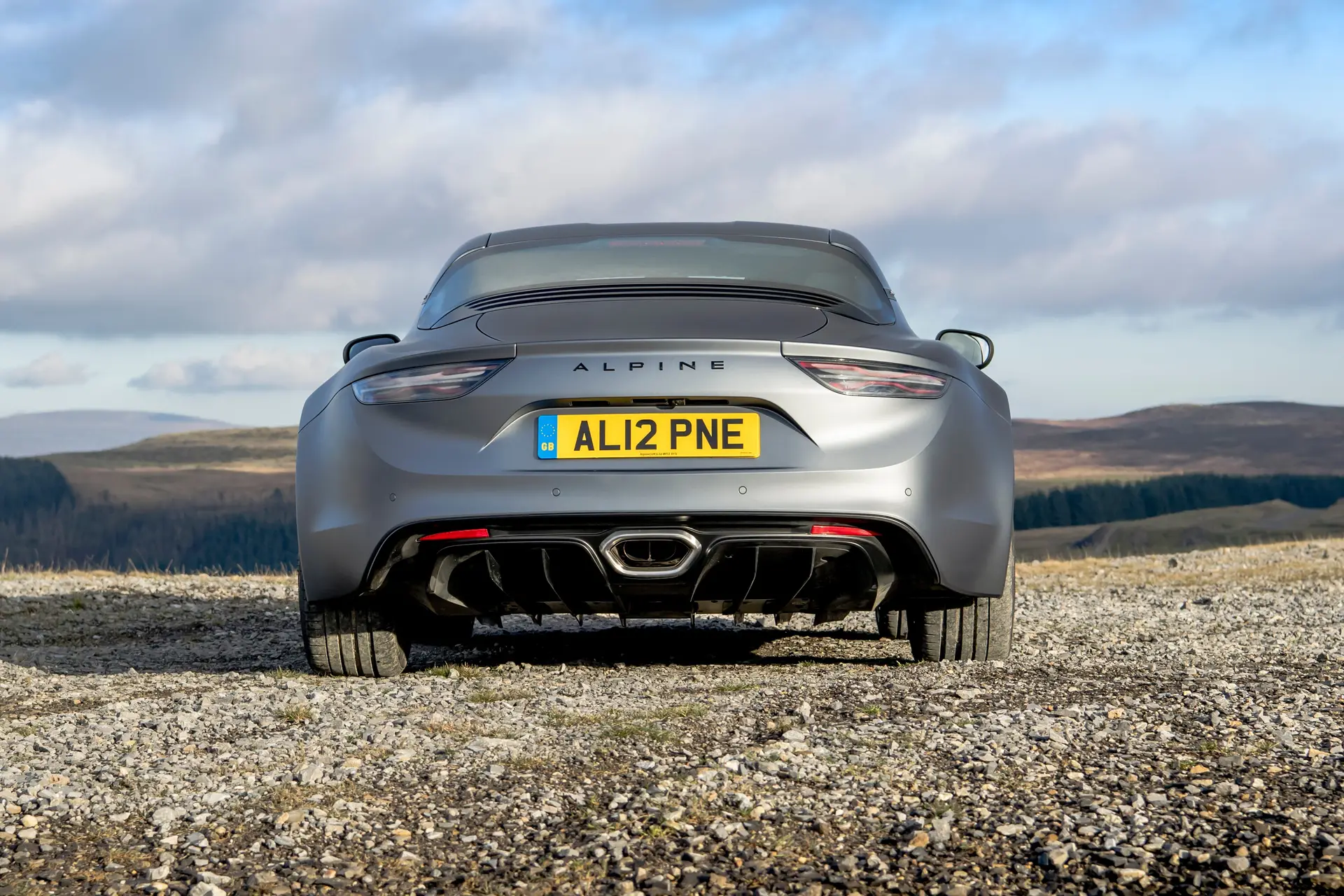
The Alpine A110 has sold in relatively small numbers, and combined with its strong enthusiast appeal and low miles covered in them means you won't find a bargain. Even a 2018 base model (with about 10,000 miles on the clock) will still be around £42,500 - and that's not much less than it cost when new.
Trim levels and standard equipment
The Alpine A110 Pure is arguably the perfect basic specification if you’re really committed to Alpine’s purist philosophy, but it’s difficult not to be seduced by the Legende above it, as it adds a few desirable things to the standard equipment.
The Alpine A110 Legende gains useful front and rear parking sensors and a reversing camera, aluminium pedals, an improved audio system and larger 18-inch alloy wheels (over the 17-inch wheels of the Pure). The Alpine A110S gets the sports exhaust (an option on both the Pure and Legende which is worth looking for) as standard, it also gets a higher performance braking system among its range-topping specification.
As easy as it is to be seduced by the promise of the A110S’s greater power, the performance differential is smaller in reality than you’d thin. Indeed, the A110S’s changes to the chassis actually lessen the appeal of the A110.
Occasionally there are special models, the A110 was introduced with the Premiere edition, while Alpine is offering a Color (sic) Edition based on the A110S throughout 2020. Expect more specials in time as Alpine attempts to maintain interest in its small volume, niche model.
Ask the heycar experts: common questions
Who makes the Alpine A110 engine?
How much is an Alpine A110?
Is the Alpine A110 a Renault?
Similar Models
Stay up to speed with great offers plus the latest car news and reviews
Keep me updated by email with the latest advice, news and offers from heycar.
By submitting you agree to our privacy policy


